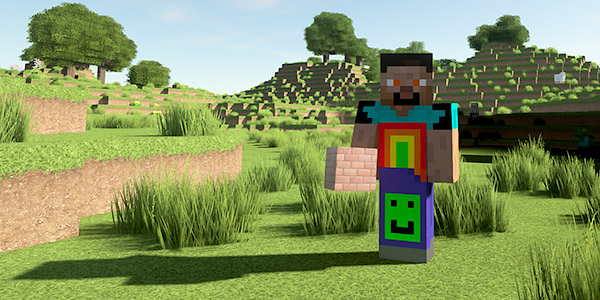THE MEANINGS OF MASKS
The mask is a badge of honor | Eric Klopfer
On the social and civic meaning of pandemic masking

Eric Klopfer; photo via MIT OCW
“In this pandemic era, what a mask really says is, ‘I care about YOU.’ That is an important and powerful message that we should champion and commend. During a pandemic, the mask is a badge of honor, indicating that you are protecting the health of others during a crisis."
— Eric Klopfer, Professor; Head, Comparative Media Studies/Writing; and Director, the Education Arcade
SERIES | THE MEANINGS OF MASKS
As The Washington Post has reported, "at the heart of the dismal US coronavirus response" is a "fraught relationship with masks." With this series of commentaries — inspired by ideas from Associate Professor of Literature Sandy Alexandre — MIT faculty explore the myriad historic, creative, and cultural meanings of masks to offer new ways to appreciate and practice protective masking — currently a primary way to contain the Covid-19 pandemic.
Professor Eric Klopfer is the head of MIT Comparative Media Studies/Writing (CMS/W) and director of the Scheller Teacher Education Program and the Education Arcade at MIT. He is also a co-faculty director for MIT’s J-WEL World Education Lab, and the co-founder/past-president of the non-profit Learning Games Network. SHASS Communications spoke with him in July 2020.
• • •
Q: Humans use masks for a variety of purposes, ranging from protection to play to artful and ceremonial performance. What are some important examples of masks and masking drawn from your discipline?
A: My colleague in CMS/W, Scot Osterweil, often speaks about the "four freedoms of play." One of these freedoms is the "freedom to try on identities." Play gives us opportunities to pretend to be other people, creatures, or things. Sometimes we do this simply through imagination, but often we do this by changing our appearance. We play through costumes and masks in real life or through our choice of representations and apparel online.
Avatars, or digital representations, help us explore different identities in online and digital spaces. This can be empowering as it enables us to see ourselves in new ways; it can also be illuminating to see how others respond to such representations. The items and apparel with which we equip our characters is part of what makes them special. Displaying a unique or powerful item is a treasured aspect of many online games; commonly they represent an accomplishment or achievement.
Many of these digital representations have made the leap into the real world. Go to any video game convention or show, and you'll find many folks dressing up like the characters they play in video games, masks and all. My favorite story of this kind was from my son. When he was a bit younger, he was an avid Minecraft player and spent a great deal of time customizing his Minecraft character to look as he thought of himself in real life. On Halloween, he then created a mask and costume to look like that digital representation of his physical self. Life reflects art, which reflects life.

Image of Eric Klopfer's "skin" in Minecraft, designed by his son
"Avatars, or digital representations, help us explore different identities in online and digital spaces. This can be empowering as it enables us to see ourselves in new ways; it can also be illuminating to see how others respond to such representations."
Q: Given this cultural history, can you speculate on ways in which people today might explore the possibilities and understandings of masks that are needed for protection from the virus?
A: Masks clearly reveal something about mask wearers. Right now, they are being politicized in the U.S. Masks are conspicuous, so it is easy to use them as political identifiers if one chooses to do so. But we can and should change the meaning of this treasured item. In this pandemic era, what a mask really says is, "I care about YOU." That is an important and powerful message. It is one that we should champion and commend.
We can also have fun with masks. They can be representations of our favorite characters in real life or from fiction. They can take the place of funny and kitschy T-shirts. But the key to any of that is the understanding that, during a pandemic, the mask is a badge of honor, indicating the important role that you are playing in protecting the health of others during a crisis.
Q: What is the favorite mask you have ever worn or seen someone else wear? Why did it appeal to you?
A: I think my favorite masks are the ones that don't look like much until you get close — such as one that says, "If you can read this, please back up." But I think, increasingly, that fun or uplifting masks and masks that directly express the sentiment that "I'm doing this for you" will be important in helping to inspire the use of this vital protective gear.
_______
Professor Eric Klopfer is the head of MIT Comparative Media Studies/Writing (CMS/W) and director of the Scheller Teacher Education Program and the Education Arcade at MIT. He is also a co-faculty director for MIT’s J-WEL World Education Lab, and the co-founder/past-president of the non-profit Learning Games Network. His work uses a Design Based Research methodology to span the educational technology ecosystem, from design and development of new technologies to professional development and implementation. Much of Klopfer's research has focused on computer games and simulations for building understanding of science, technology, engineering and mathematics. He is the co-author of the books Adventures in Modeling, The More We Know, and Resonant Games, and the author of Augmented Learning. His lab has produced software used by millions of people and online courses that have reached hundreds of thousands.
Suggested links
MIT Comparative Media Studies/Writing
Scheller Teacher Education Program & The Education Arcade
Book: Augmented Learning
In this overview of mobile learning games, Klopfer argues for the educational advantages of hand-held games over their big-screen counterparts.
The Learning Game Network
Klopfer is the co-founder and past President of the non-profit Learning Games Network, which broadens access to high-quality educational games for learners at every age.
Prepared by MIT SHASS Communications
Series Editor and Designer: Emily Hiestand
Editorial Consultant: Kathryn O'Neill
Publication: 3 July 2020